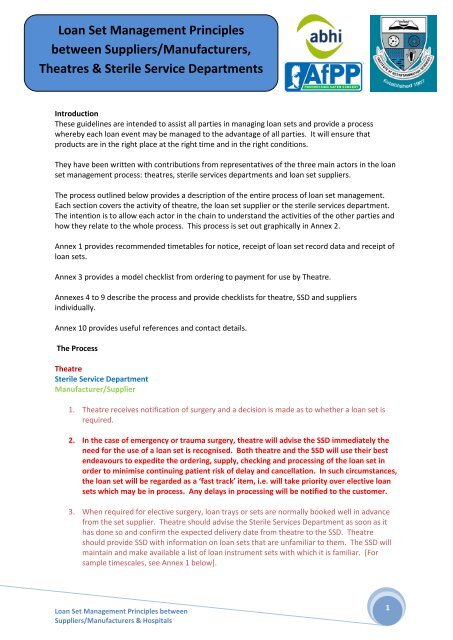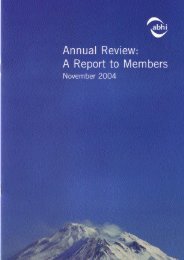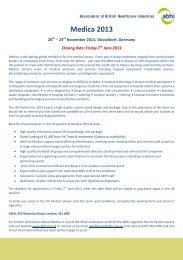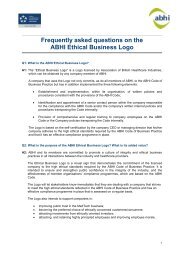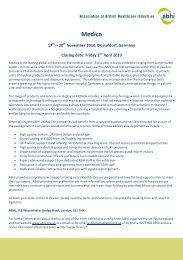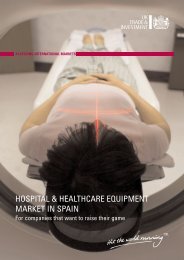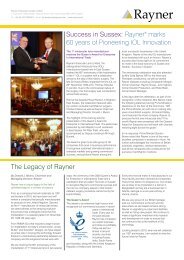Loan Set Management Principles between Suppliers/Manufacturers ...
Loan Set Management Principles between Suppliers/Manufacturers ...
Loan Set Management Principles between Suppliers/Manufacturers ...
You also want an ePaper? Increase the reach of your titles
YUMPU automatically turns print PDFs into web optimized ePapers that Google loves.
<strong>Loan</strong> <strong>Set</strong> <strong>Management</strong> <strong>Principles</strong><strong>between</strong> <strong>Suppliers</strong>/<strong>Manufacturers</strong>,Theatres = & Sterile Service DepartmentsIntroductionThese guidelines are intended to assist all parties in managing loan sets and provide a processwhereby each loan event may be managed to the advantage of all parties. It will ensure thatproducts are in the right place at the right time and in the right conditions.They have been written with contributions from representatives of the three main actors in the loanset management process: theatres, sterile services departments and loan set suppliers.The process outlined below provides a description of the entire process of loan set management.Each section covers the activity of theatre, the loan set supplier or the sterile services department.The intention is to allow each actor in the chain to understand the activities of the other parties andhow they relate to the whole process. This process is set out graphically in Annex 2.Annex 1 provides recommended timetables for notice, receipt of loan set record data and receipt ofloan sets.Annex 3 provides a model checklist from ordering to payment for use by Theatre.Annexes 4 to 9 describe the process and provide checklists for theatre, SSD and suppliersindividually.Annex 10 provides useful references and contact details.The ProcessTheatreSterile Service DepartmentManufacturer/Supplier1. Theatre receives notification of surgery and a decision is made as to whether a loan set isrequired.2. In the case of emergency or trauma surgery, theatre will advise the SSD immediately theneed for the use of a loan set is recognised. Both theatre and the SSD will use their bestendeavours to expedite the ordering, supply, checking and processing of the loan set inorder to minimise continuing patient risk of delay and cancellation. In such circumstances,the loan set will be regarded as a ‘fast track’ item, i.e. will take priority over elective loansets which may be in process. Any delays in processing will be notified to the customer.3. When required for elective surgery, loan trays or sets are normally booked well in advancefrom the set supplier. Theatre should advise the Sterile Services Department as soon as ithas done so and confirm the expected delivery date from theatre to the SSD. Theatreshould provide SSD with information on loan sets that are unfamiliar to them. The SSD willmaintain and make available a list of loan instrument sets with which it is familiar. [Forsample timescales, see Annex 1 below].<strong>Loan</strong> <strong>Set</strong> <strong>Management</strong> <strong>Principles</strong> <strong>between</strong><strong>Suppliers</strong>/<strong>Manufacturers</strong> & Hospitals1
4. Where the SSD is notified that the theatre intends to use a loan set that the SSD is unfamiliarwith then the SSD will notify the theatre, within 24 hours, to arrange a longer process timeto allow for training and processing. [For sample timescales, see Annex 1 below].5. In the case of emergency or trauma surgery, SSD will have been advised and shouldexpedite all processes in order to minimise continuing patient risk as described above.6. Theatres contact the loan set supplier to arrange delivery to a specified location(s) in goodtime to allow for checking, reprocessing and training if required. A purchase order should besupplied at the time to cover the consumables used and/or hire charges if applicable.Theatres should be aware that additional time will be required to facilitate training for boththeatre and SSD staff if an unfamiliar kit is involved.7. <strong>Loan</strong> supplier confirms details of loan: instruments, implants, costs, dates of delivery andcollection. <strong>Loan</strong> suppliers should be aware that first-time users may require extended loantimes to allow for training in theatres and SSD.8. Theatre confirms details with the SSD both verbally and in writing.NOTES: Theatres should use all reasonable endeavours to inform the SSD at the earliestopportunity and, where practical, at least 48 hours ahead of the required time for theloan instrument sets to be available for use (provided that the equipment can beprocessed using standard UK decontamination processes). The theatre should also use all reasonable endeavours to provide the SSD with the setno less than 48 hours before they are required for use. The theatre should also give recognition to the additional time that may be required forloan instrument sets that are unfamiliar to the SSD. There may be special processingrequirements (process compatibility review) or training requirements that are requiredto be organised as well as setting up of tray information on the IT system.9. <strong>Loan</strong> supplier delivers instruments and implants to a specified location(s) for initial check bytheatre. All deliveries should be accompanied by: delivery note, reprocessing instructions,decontamination certificate, detailed instrument tray lists, by tray and in a logical layout.Include product codes and photographic documentation where possible.NOTES: The supplier should also ensure that the weight of any individual tray does not present amanual handling risk (see HSE Guidance – Getting to Grips with Manual Handling). Reprocessing instructions should conform to EN ISO 17664 and should includedisassembly diagrams where applicable. <strong>Loan</strong> set suppliers should have a robust track-and-trace system for instrument trays.This will assist Trusts in the event they need to trace patients on whom the device hasbeen subsequently used in the event of vCJD being diagnosed in an earlier patient. <strong>Loan</strong> set suppliers should ensure that migration of instruments does not take place<strong>between</strong> sets. Instruments should be linked to trays with serial numbers.10. On receipt at theatre, instruments and implants should be checked for completeness andany discrepancies should be notified to the loan set supplier immediately.11. The SSD should also be informed of any potential delay.<strong>Loan</strong> <strong>Set</strong> <strong>Management</strong> <strong>Principles</strong> <strong>between</strong><strong>Suppliers</strong>/<strong>Manufacturers</strong> & Hospitals2
12. Theatre sends checked and inspected instruments to SSD within the agreed timescaleaccording to the hospital’s procedures, confirming the date and time of the operation, andsending any documentation necessary as defined within this guidance. SSD to be informedby telephone call of the set’s impending arrival.13. SSD receives the instrument sets and documentation necessary for reprocessing: <strong>Loan</strong> Tray Form: fully completed by theatre. Valid Decontamination Certificate: from the loan set supplier. Tray Content Sheet (this should be a list of the actual contents per tray and not simply alist of instruments in the set. Tray specification shall include product codes whereavailable and photographic evidence where possible). Manufacturer’s Reprocessing Instructions in accordance with EN ISO 17664: any specialrequirements for assembly/disassembly, lubrication or functional testing should beprovided.14. If the SSD finds any discrepancies in the loan set, such as damaged or missing instruments,the SSD will quarantine the set in an unprocessed condition for the theatre or loan setcompany to inspect. The SSD should alert theatre of the reason for the quarantine within 30minutes of the discrepancies being discovered.15. SSD establishes tray(s) on the IT system and generates tracking labels for theatre use inorder to allow tracking back to the decontamination process.16. Process instrument sets according to local procedures.17. SSD dispatches loan sets and documentation (tray content sheet & loan tray form) totheatre.18. Theatre inspects sets to ensure packaging is undamaged and sterility is not compromised.19. Theatre checks immediately prior to procedure to ensure all instruments are present and inthe correct tray location prior to use.20. Operation performed.21. Theatre takes responsibility for tracking tray details to the patient.22. Theatre checks to ensure all instruments are present and in the correct tray location prior toreturn to SSD23. Theatre completes usage form enclosed with the loan set supplier’s documentation andreconfirm purchase order if necessary.24. Theatre returns sets to SSD for reprocessing as per local procedures.25. SSD reprocesses sets for return to theatre for collection by supplier. Trays should be free oflocally-fixed tape or labels. (If trays are to be collected from SSD then SSD ensures that setsare appropriately containerised/packaged and addressed for collection by supplier at theagreed time.) The SSD should ensure that migration of instruments does not take place<strong>between</strong> trays/sets while in their care.<strong>Loan</strong> <strong>Set</strong> <strong>Management</strong> <strong>Principles</strong> <strong>between</strong><strong>Suppliers</strong>/<strong>Manufacturers</strong> & Hospitals3
26. SSD returns sets to theatre within the agreed timescale in readiness for collection by thesupplier. <strong>Set</strong>s should be accompanied by decontamination certificates.27. Theatre ensures sets are appropriately containerised/packaged and addressed forcollection by supplier at the agreed time.28. Supplier collects sets from theatre or pre-arranged point.<strong>Loan</strong> <strong>Set</strong> <strong>Management</strong> <strong>Principles</strong> <strong>between</strong><strong>Suppliers</strong>/<strong>Manufacturers</strong> & Hospitals4
<strong>Loan</strong> <strong>Set</strong> <strong>Management</strong> <strong>Principles</strong> <strong>between</strong> <strong>Suppliers</strong>/<strong>Manufacturers</strong>,Theatres & Sterile Service DepartmentsAnnex 1Recommended Timetables for Notice, Receipt of <strong>Loan</strong> <strong>Set</strong> RecordData and Receipt of <strong>Loan</strong> KitsThe tables below give examples of timings for receipt both of trays familiar to the SSD and thosethat have not been seen before. These timings assume that the SSD is working 7 days, if this isnot the case then they should be adjusted accordingly.Day of Clinical Use<strong>Loan</strong> sets familiar to SSDNotice of <strong>Loan</strong> <strong>Set</strong>Requirement<strong>Loan</strong> <strong>Set</strong> Record to besent to SSD andFollow-up TelephoneCall<strong>Loan</strong> <strong>Set</strong> available forcollection from theCustomer (Theatre)Monday* Wednesday 1 p.m. Friday 1 p.m. Friday 1 p.m.Tuesday Thursday 1 p.m. Friday 8 a.m. Friday 1 p.m.Wednesday Friday 1 p.m. Monday 1 p.m. Monday 1 p.m.Thursday Monday 1 p.m. Tuesday 1 p.m. Tuesday 1 p.m.Friday Tuesday 1 p.m. Wednesday 1 p.m. Wednesday 1 p.m.Saturday* Wednesday 1 p.m. Thursday 1 p.m. Thursday 1 p.m.Sunday* Wednesday 1 p.m. Friday 9 a.m. Friday 9 a.m.Day of Clinical Use<strong>Loan</strong> sets to be processed for the first time on a specific siteNotice of <strong>Loan</strong> <strong>Set</strong>Requirement<strong>Loan</strong> <strong>Set</strong> Record to besent to SSD andFollow-up TelephoneCall<strong>Loan</strong> <strong>Set</strong> available forcollection from theCustomer (Theatre)Monday* Wednesday 1 p.m. Wednesday 1 p.m. Thursday 1 p.m.Tuesday Thursday 1 p.m. Thursday 1 p.m. Friday 1 p.m.Wednesday Friday 1 p.m. Friday 1 p.m. Monday 1 p.m.Thursday Monday 1 p.m. Monday 1 p.m. Tuesday 1 p.m.Friday Tuesday 1 p.m. Tuesday 1 p.m. Wednesday 1 p.m.Saturday* Wednesday 1 p.m. Wednesday 1 p.m. Thursday 1 p.m.Sunday* Wednesday 1 p.m. Thursday 1 p.m. Thursday 1 p.m.* SSD should be notified by Theatre of all planned <strong>Loan</strong> <strong>Set</strong> requirements for Weekend andMonday use by Wednesday 1 p.m. at the latest.<strong>Loan</strong> <strong>Set</strong> <strong>Management</strong> <strong>Principles</strong> <strong>between</strong><strong>Suppliers</strong>/<strong>Manufacturers</strong> & Hospitals5
<strong>Loan</strong> <strong>Set</strong> <strong>Management</strong> <strong>Principles</strong> <strong>between</strong> <strong>Suppliers</strong>/<strong>Manufacturers</strong>, Theatres & Sterile Service DepartmentsAnnex 2Theatre SSD Supplier EMERGENCY PROVISIONS Dashed outline indicates a potential delay in the process<strong>Loan</strong> <strong>Set</strong> <strong>Management</strong> <strong>Principles</strong> <strong>between</strong><strong>Suppliers</strong>/<strong>Manufacturers</strong> & Hospitals
<strong>Loan</strong> <strong>Set</strong> <strong>Management</strong> <strong>Principles</strong> <strong>between</strong><strong>Suppliers</strong>/<strong>Manufacturers</strong> & Hospitals
<strong>Loan</strong> <strong>Set</strong> <strong>Management</strong> <strong>Principles</strong> <strong>between</strong> <strong>Suppliers</strong>/<strong>Manufacturers</strong>,Theatres & Sterile Service DepartmentsAnnex 3<strong>Loan</strong> Kit Order to Payment Model Checklist(Theatres)This model checklist, which should be tailored for individual circumstances, includes the end-to-endactivities from ordering to payment regarding <strong>Loan</strong> Kit used in Theatres. In the example given,Theatres have a named individual/team in Theatres responsible for Materials Ordering (MO). Thisshould be substituted with any local theatre terminology.PROCESS DESCRIPTION01 Materials Ordering (MO) receive loan kit requirements fromDepartment of Surgery/Theatres.02 MO creates a requisition on the organisations procurement systemwith estimated total cost, any hospital number and reference. Thisinformation is also recorded onto any loan kit sheet that is used as anaudit trail within the Theatre.03 Responsible person in Theatres contacts the supplier and orders theloan kit with the requisition number given by MO.04 <strong>Suppliers</strong> send out the loan kit with the requisition number. Each loankit order has one corresponding requisition number.05 Responsible person in Theatres counts the contents of each loan kitbefore use and updates the count sheet.06 Responsible person in Theatres counts the contents of each loan kitafter use and updates the count sheet before returning the loan kit tosuppliers.07 MO completes the requisition with total line value of the loan kit andsends for approval. This information is updated back onto the loan kitsheet.08 Department of Surgery/Theatres review the requisition and approve ifagree. Return the requisition to MO otherwise.09 Hospital Supplies Department issue and confirm the purchase orderagainst the approved requisition.10 Responsible person in Theatres will complete the goods receipt foreach purchase order. This information is updated back onto the loankit sheet.11 <strong>Suppliers</strong> send invoices quoting requisition number to organisationspayment/finance department.12 Organisations payment/finance department reconcile the invoice togoods receipt and authorise payment.RESPONSIBILITYTheatreMO/ TheatreTheatre<strong>Loan</strong> Kit <strong>Suppliers</strong>TheatreTheatreMODepartment ofSurgery/TheatresHospital SuppliesDepartmentTheatre<strong>Loan</strong> Kit <strong>Suppliers</strong>Payment/financedepartment<strong>Loan</strong> <strong>Set</strong> <strong>Management</strong> <strong>Principles</strong> <strong>between</strong><strong>Suppliers</strong>/<strong>Manufacturers</strong> & Hospitals8
<strong>Loan</strong> <strong>Set</strong> <strong>Management</strong> <strong>Principles</strong> <strong>between</strong> <strong>Suppliers</strong>/<strong>Manufacturers</strong>, Theatres& Sterile Service DepartmentsAnnex 4Process for Theatres1. Theatre receives notification of surgery and a decision is made as to whether a loan set isrequired.2. In the case of emergency or trauma surgery, theatre will advise the SSD immediately the needfor the use of a loan set is recognised. Both theatre and the SSD will use their best endeavoursto expedite the ordering, supply, checking and processing of the loan set in order to minimisecontinuing patient risk of delay and cancellation. In such circumstances, the loan set will beregarded as a ‘fast track’ item, i.e. will take priority over elective loan sets which may be inprocess. Any delays in processing will be notified to the customer.3. When required for elective surgery, loan trays or sets are normally booked well in advance fromthe set supplier. Theatre should advise the Sterile Services Department as soon as it has done soand confirm the expected delivery date from theatre to the SSD. Theatre should provide SSDwith information on loan sets that are unfamiliar to them. The SSD will maintain and makeavailable a list of loan instrument sets with which it is familiar. [For sample timescales, seeAnnex 1].4. Theatres contact the loan set supplier to arrange delivery to a specified location(s) in good timeto allow for checking, reprocessing and training if required. A purchase order should be suppliedat the time to cover the consumables used and/or hire charges if applicable. Theatres should beaware that additional time will be required to facilitate training for both theatre and SSD staff ifan unfamiliar kit is involved.5. Theatre confirms details with the SSD both verbally and in writing.NOTES: Theatres should use all reasonable endeavours to inform the SSD at the earliest opportunityand, where practical, at least 48 hours ahead of the required time for the loan instrumentsets to be available for use (provided that the equipment can be processed using standardUK decontamination processes). The theatre should also use all reasonable endeavours to provide the SSD with the set noless than 48 hours before they are required for use. The theatre should also give recognition to the additional time that may be required for loaninstrument sets that are unfamiliar to the SSD. There may be special processingrequirements (process compatibility review) or training requirements that are required to beorganised as well as setting up of tray information in the IT system.6. On receipt at theatre, instruments and implants should be checked for completeness and anydiscrepancies should be notified to the loan set supplier immediately.7. The SSD should also be informed of any potential delay.8. Theatre sends checked and inspected instruments to SSD within the agreed timescale accordingto the hospital’s procedures, confirming the date and time of the operation, and sending anydocumentation necessary as defined within this guidance. SSD to be informed by telephone callof the set’s impending arrival.9. Theatre inspects sets to ensure packaging is undamaged and sterility is not compromised.<strong>Loan</strong> <strong>Set</strong> <strong>Management</strong> <strong>Principles</strong> <strong>between</strong><strong>Suppliers</strong>/<strong>Manufacturers</strong> & Hospitals9
10. Theatre checks immediately prior to procedure to ensure all instruments are present and in thecorrect tray location prior to use.11. Operation performed.12. Theatre takes responsibility for tracking tray details to the patient.13. Theatre checks to ensure all instruments are present and in the correct tray location prior toreturn to SSD14. Theatre completes usage form enclosed with the loan set supplier’s documentation andreconfirm purchase order if necessary.15. Theatre returns sets to SSD for reprocessing as per local procedures.16. Theatre ensures sets are appropriately containerised/packaged and addressed forcollection by supplier at the agreed time.<strong>Loan</strong> <strong>Set</strong> <strong>Management</strong> <strong>Principles</strong> <strong>between</strong><strong>Suppliers</strong>/<strong>Manufacturers</strong> & Hospitals10
<strong>Loan</strong> <strong>Set</strong> <strong>Management</strong> <strong>Principles</strong> <strong>between</strong> <strong>Suppliers</strong>/<strong>Manufacturers</strong>, Theatres& Sterile Service DepartmentsAnnex 5Checklist for TheatresProcess Description1. Decide on need for loan set2. FOR EMERGENCY OR TRAUMA SURGERY, NOTIFY SSD IMMEDIATELY ANDEXPEDITE ALL PROCESSES3. Advise SSD on expected delivery date from theatre along with information ontype of loan set to be provided4. Contact loan set supplier in good time to allow for delivery, checking,reprocessing and training if required. Provide Purchase Order Number.5. Confirm details with SSD both verbally and in writing6. Check instrument sets and implants for completeness and notify loan setcompany of any discrepancies.7. Notify SSD of any delay due to incompleteness of instrument sets.8 Send checked and inspected instruments to SSD along with any documentationnecessary. Confirm date and time of operation to SSD. SSD to be notifed byphone of instrument dispatch.9. Inspect sets to ensure packaging integrity and assure sterility.10. Check that all instruments are present, in the correct tray and in the correcttray location.11. Operation performed.12. Track tray details to patient.13. Check that all instruments are present, in the correct tray and in the correcttray location.14. Complete supplier's usage form and reconfirm purchase order if necessary.15. Return sets to SSD for reprocessing.16. Ensure loan sets are appropriately containerised/packaged and addressed forcollection by supplier at the agreed time.<strong>Loan</strong> <strong>Set</strong> <strong>Management</strong> <strong>Principles</strong> <strong>between</strong><strong>Suppliers</strong>/<strong>Manufacturers</strong> & Hospitals11
<strong>Loan</strong> <strong>Set</strong> <strong>Management</strong> <strong>Principles</strong> <strong>between</strong> <strong>Suppliers</strong>/<strong>Manufacturers</strong>, Theatres& Sterile Service DepartmentsAnnex 6Process for Sterile Service Departments1. To allow adequate time for processing prior to use by theatre, it is important that the loan setand the required information is supplied to the SSD according to the timescale set out below.Where the SSD is notified that the theatre intends to use a loan set that the SSD is unfamiliarwith then the SSD will notify the theatre, within 24 hours, to arrange a longer process time toallow for training and processing. [For sample timescales, see Annex 1].2. In the case of emergency or trauma surgery, SSD will have been advised and should expediteall processes in order to minimise continuing patient risk.3. If the SSD finds any discrepancies in the loan set, such as damaged or missing instruments, theSSD will quarantine the set in an unprocessed condition for the theatre or loan set company toinspect. The SSD should alert theatre of the reason for the quarantine within 30 minutes of thediscrepancies being discovered.4. SSD receives the instrument sets and documentation necessary for reprocessing: <strong>Loan</strong> Tray Form: fully completed by theatre. Valid Decontamination Certificate: from the loan set supplier. Tray Content Sheet (this should be a list of the actual contents per tray and not simply a listof instruments in the set. Tray specification shall include product codes where available andphotographic evidence where possible). Manufacturer’s Reprocessing Instructions in accordance with EN ISO 17664: any specialrequirements for assembly/disassembly, lubrication or functional testing should beprovided.5. SSD establishes tray(s) on the IT system and generates tracking labels for theatre use in order toallow tracking back to the decontamination process.6. Process instrument sets according to local procedures.7. SSD dispatches loan sets and documentation (tray content sheet & loan tray form) to theatre.8. SSD reprocesses sets for return to theatre for collection by supplier. Trays should be free oflocally-fixed tape or labels. (If trays are to be collected from SSD then SSD ensures that sets areappropriately containerised/packaged and addressed for collection by supplier at the agreedtime.) The SSD should ensure that migration of instruments does not take place <strong>between</strong>trays/sets while in their care.9. SSD returns sets to theatre within the agreed timescale in readiness for collection by thesupplier. <strong>Set</strong>s should be accompanied by decontamination certificates.<strong>Loan</strong> <strong>Set</strong> <strong>Management</strong> <strong>Principles</strong> <strong>between</strong><strong>Suppliers</strong>/<strong>Manufacturers</strong> & Hospitals12
<strong>Loan</strong> <strong>Set</strong> <strong>Management</strong> <strong>Principles</strong> <strong>between</strong> <strong>Suppliers</strong>/<strong>Manufacturers</strong>, Theatres& Sterile Service DepartmentsAnnex 7Checklist for Sterile Service DepartmentsProcess Description1. Notify theatre of longer processing time if an unfamiliar set is involved.2. FOR EMERGENCY OR TRAUMA SURGERY, EXPEDITE ALL PROCESSES3. Quarantine any sets with discrepancies, e.g. missing or damaged instruments.Inform theatre within 30 minutes and arrange for unprocessed set inspectionby theatre and/or loan set supplier.4. Receive instrument sets and documentation: <strong>Loan</strong> Tray Form,Decontamination Certificate, Tray Content Sheets, Manufacturer'sReprocessing Instructions (including any special instructions forassembly/disassembly, lubrication or functional testing).5. Establish instrument sets on the IT system and generate tracking labels fortheatre use.6. Process instrument sets according to local procedures.7. Dispatch loan sets and documentation to theatre.8. Reprocess sets according to local procedures. Ensure that trays are free oflocally-fixed tape and/or labels.9. Return sets to theatre within the agreed timescale for collection by supplier.Decontamination certificates should accompany sets.<strong>Loan</strong> <strong>Set</strong> <strong>Management</strong> <strong>Principles</strong> <strong>between</strong><strong>Suppliers</strong>/<strong>Manufacturers</strong> & Hospitals13
<strong>Loan</strong> <strong>Set</strong> <strong>Management</strong> <strong>Principles</strong> <strong>between</strong> <strong>Suppliers</strong>/<strong>Manufacturers</strong>, Theatres& Sterile Service DepartmentsAnnex 8Process for <strong>Loan</strong> Kit <strong>Suppliers</strong>1. <strong>Loan</strong> supplier confirms details of loan: instruments, implants, costs, dates of delivery andcollection. <strong>Loan</strong> suppliers should be aware that first-time users may require extended loantimes to allow for training in theatres and SSD.2. <strong>Loan</strong> supplier delivers instruments and implants to a specified location(s) for initial check bytheatre. All deliveries should be accompanied by: delivery note, reprocessing instructions,decontamination certificate, detailed instrument tray lists, by tray and in a logical layout.Include product codes and photographic documentation where possible.NOTES: The supplier should also ensure that the weight of any individual tray does not present amanual handling risk (see HSE Guidance – Getting to Grips with Manual Handling). Reprocessing instructions should conform to EN ISO 17664 and should include disassemblydiagrams where applicable. <strong>Loan</strong> set suppliers should have a robust track-and-trace system for instrument trays. Thiswill assist Trusts in the event they need to trace patients on whom the device has beensubsequently used in the event of vCJD being diagnosed in an earlier patient. <strong>Loan</strong> set suppliers should ensure that migration of instruments does not take place <strong>between</strong>sets. Instruments should be linked to trays with serial numbers.3. Supplier collects sets from theatre or pre-arranged point.<strong>Loan</strong> <strong>Set</strong> <strong>Management</strong> <strong>Principles</strong> <strong>between</strong><strong>Suppliers</strong>/<strong>Manufacturers</strong> & Hospitals14
<strong>Loan</strong> <strong>Set</strong> <strong>Management</strong> <strong>Principles</strong> <strong>between</strong> <strong>Suppliers</strong>/<strong>Manufacturers</strong>, Theatres& Sterile Service DepartmentsAnnex 9Checklist for <strong>Loan</strong> Kit <strong>Suppliers</strong>Process Description1. Confirm details of loan: instruments, implants, costs, dates of delivery andcollection. Allow for extended loan time for first-time users.2. Deliver loan set for checking by theatre. Include delivery note, reprocessinginstructions, decontamination certificate, tray lists and, where possible,product codes and photographic documentation3. Collect sets from theatre or pre-arranged point<strong>Loan</strong> <strong>Set</strong> <strong>Management</strong> <strong>Principles</strong> <strong>between</strong><strong>Suppliers</strong>/<strong>Manufacturers</strong> & Hospitals15
<strong>Loan</strong> <strong>Set</strong> <strong>Management</strong> <strong>Principles</strong> <strong>between</strong> <strong>Suppliers</strong>/<strong>Manufacturers</strong>, Theatres& Sterile Service DepartmentsAnnex 10List of References & ContactsEN ISO 17664: 2004Sterilization of medical devices - Information to be provided by the manufacturer for theprocessing of resterilizable medical devicesGetting to grips with manual handling – A short guidewww.hse.gov.uk/pubns/indg143.pdfABHIAssociation of British Healthcare Industries, 111 Westminster Bridge Road, London, SE1 7HRTel: +44 (0)20 7960 4360, Fax: +44 (0)20 7960 4361, Email: enquiries@abhi.org.uk,Web: www.abhi.org.ukAfPPAssociation for Perioperative Practice, Daisy Ayris House, 6 Grove Park Court, Harrogate,North Yorkshire, HG1 4DPTel: +44 (0)1423 508079, Fax: +44 (0)1423 531613,Email: www.afpp.org.uk/contact-us/contact-us, web: www.afpp.org.ukIDScInstitute of Decontamination Sciences, c/o Fitwise <strong>Management</strong> Limited, c/o Fitwise<strong>Management</strong> Limited, Drumcross Hall, Bathgate,West Lothian, EH48 4JTTel: +44 (0)1506 811077, Fax: +44 (0)1506 811477, E-mail: idsc@fitwise.co.uk,web: www.idsc-uk.co.uk<strong>Loan</strong> <strong>Set</strong> <strong>Management</strong> <strong>Principles</strong> <strong>between</strong><strong>Suppliers</strong>/<strong>Manufacturers</strong> & Hospitals16


